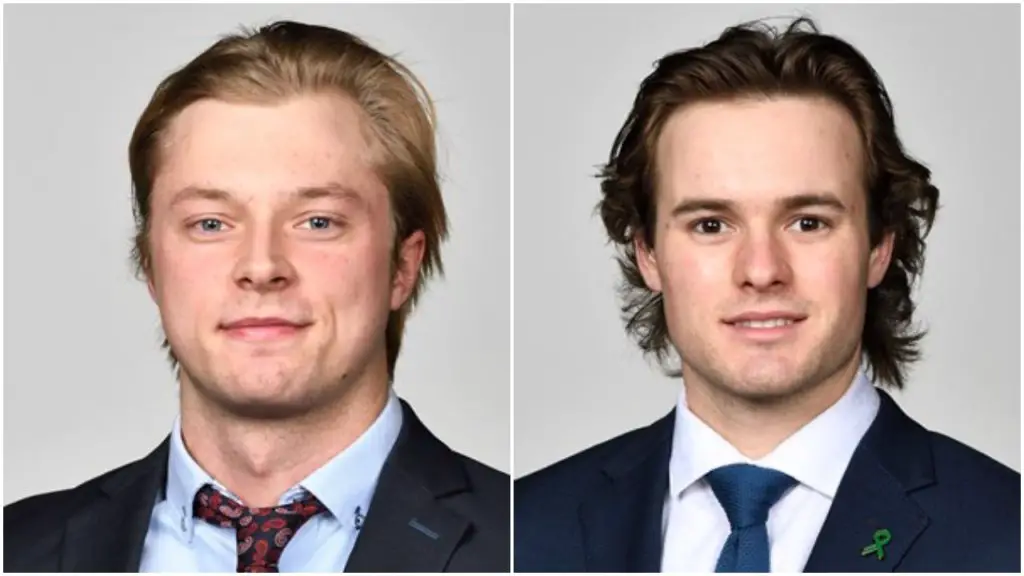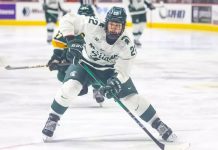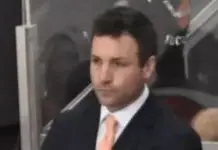
Massachusetts coach Greg Carvel comes across to the average person as somewhat soft spoken, very transparent, and most certainly mild mannered.
And whether he is being somewhat sarcastic, when he tells you that he is sick of people asking about which goaltender is going to start his next game, there’s probably a small amount of truth.
“It’s given the media a question to ask about goalies every week for the last couple of years and I didn’t want to answer the questions this year,” Carvel said of his game-by-game decision to play one of two of the nation’s best netminders, Filip Lindberg and Matt Murray, each game. “I told the goaltenders this year, ‘Why don’t you make me play you every night?’ Matt did that for a long stretch, now Filip is doing the same.”
While Murray had an impressive streak that places him 13th nationally among eligible goaltenders in GAA, Murray’s teammates and Lindberg’s stats over the last four UMass games, all of which Lindberg started, have been out of this world.
Lindberg has allowed just two goals in his four starts, shutting out Providence and UMass Lowell while allowing each of those opponents just a single goal in the other two starts.
It’s as good of a stretch as a coach could imaging and makes Carvel’s decision on who to start each game a lot easier.
“I would love one of them to just win every game; I’d never have to think about it,” said Carvel. “What Filip’s done over the last four games – two goals over a four-game stretch – it’s probably pretty hard to top that.”
Prior to Lindberg’s impressive quartet of games, Murray wasn’t anything too shabby, going 8-3-0 in an 11-game stretch. Some of that time Lindberg was injured, not dressing for most of those games and unable to grasp away the starting role immediately when he was healthy.
That, Carvel says, may have made him more hungry.
“I have no stats or science to back this up, but I believe when players have long-term injuries and are forced to watch from a distance, it helps them gain a different perspective and it helps them iron out things they struggle with,” said Carvel. “I’ve seen that a number of times, and I think that was the case with Filip.
“You’re watching a game and you’re not upset, ‘Why didn’t coach dress me?’ It’s [the revelation] that ‘I can’t play, I’m hurt.’ For Filip, his quality of play is more mental than physical. For whatever reason, since he’s come back, he’s been mentally really on top of his game. He looks really comfortable in net and that’s when I know that he’s mentally in a good, comfortable spot.”
New Hampshire feeling brunt of packed schedule
Many teams have faced long shutdowns because of COVID this season. Whether the team has players with active cases or whether the school or local government has forced teams to shut down, often schedules become compressed.
For New Hampshire, that was the case in the month of January. And in the end, the Wildcats seemed a bit damaged by it.
Prior to January 1, UNH played just three games. Since New Year’s Day, the Wildcats have played 12 times, much greater than the average of eight games a month most teams face in a normal season.
This season isn’t normal and UNH not only came through that stretch 2-9-1, they also encountered a significant amount of injuries.
“We lost some key players for some time,” said UNH coach Mike Souza. “Now looking back on it, sometimes I keep myself up, because I was one of the coaches in the league that was adamant about that we owed it to the kids that we needed to play as many games as possible after what they had to endure.
“The reality was we played a lot of games without having a lot of practice. Injuries and not being in sync, I think we paid the price for not playing those games, but I wouldn’t change anything. If we’d won them, we’d be saying that was a great call.
In the end, Souza, whose team this weekend when it faces UMass Lowell will likely be the most healthy is has been all season, gets plenty of credit for the path they’ve traveled.
“I’m very proud of the guys we have representing our program,” Souza said. “They show up here every day ready to play. That’s not just hyperbole. It’s frustrating, no doubt, but I truly believe we’ll be better for it as individuals and collectively as a program.”
Metcalf knows playing a championship at TD Garden is out, looks for options
Hockey East commissioner Steve Metcalf has taken a realist’s approach towards the postseason.
While there are still options on the table on how the postseason will take place, one thing seems clear: there won’t be a tournament at the TD Garden to crown the Hockey East champion.
“We’re not going to be going to the Garden,” Metcalf said. “The Garden hasn’t had any fans for any events yet. Until they have fans for the Bruins or the Celtics, it certainly wouldn’t make sense for the Hockey East championship.
Metcalf said that the tournament will be played on campus, though didn’t say whether every single game will be hosted by the top seed, possibly laying the framework to playing the semifinals and finals in one central venue given home ice is erased by the lack of fans.
Metcalf did say that the most important aspect of the postseason is inclusivity, guaranteeing that all 11 teams will make the playoffs.
“Every team is going to be in the playoffs,” Metcalf said. “That was a sensible decision, the best decision, for this year. I think it put a lot of people’s minds at ease.”
Though nothing is final, it does seem like the league is leaning towards playing the tournament in a condensed timeframe with single elimination, not best two-of-three, being used in every one of the four rounds.
UConn’s Cavanaugh looks for silver lining in COVID season
Connecticut’s men are having one of its best seasons in their history in Hockey East.
After beginning 1-4-1, UConn has rattled off a 6-2-1 mark in its last nine and is a couple of wins away from jumping into the top four in the league for winning percentage based on number of points available.
Coach Mike Cavanaugh is certainly enjoying the ride.
It’s been difficult for Cavanaugh as it has been for many teams. But the eighth-year coach has found a few benefits to coaching in a strange time.
“The one positives that’s come out of [COVID] is the afternoon games. For the student-athlete, that’s been fantastic,” said Cavanaugh. “This weekend we played two 3:00 games. And the ability to be home, in your own room or house at 8:00 for the student-athlete is fantastic. They can get a really proper night’s sleep.”
With the Huskies playing well, it may be disappointing not to be able to put a decent crowd inside the XL Center in downtown Hartford, a former NHL building that belonged to the Hartford Whalers. Though the building may be larger than a college crowd could pack, UConn, over the years, has created an excellent atmosphere in the building, curtaining off some seats and developing a loyal downtown Hartford fan base, particularly on Friday nights.
Though that has been set aside this season with fans absent (and UConn playing back on campus at Freitas Ice Arena), Cavanaugh still feels engaged with his fanbase.
“One of the benefits of COVID is we are streaming all of these games live. You’d be surprised by how many people are actually watching them. I get a lot of messages, whether through email or text, who’ve watched the games. And sometimes, these afternoon games make it easier for people to watch the games.
“We’re going to looking back on COVID and say what were some of the benefits. And being able to stream all of our games was one of the positives.”


